On 16th December 2019, I wrote to the chaplain at the Dundalk Institute of Technology (DkIT). Fr Paddy Rushe is a Roman Catholic priest who had been acting in this role for some years, even though DkIT is a secular and fully State-funded Institute with no religious involvement whatsoever.
My correspondence proposed to Fr Rushe that he should facilitate a Pastafarian service in the chaplaincy. Specifically, Fr Rushe had previously been promoting a “Prayer Book for those Affected by Addiction” across the DkIT campus. The tweet sent by Fr Rushe illustrated below, captures some examples of these promotions.
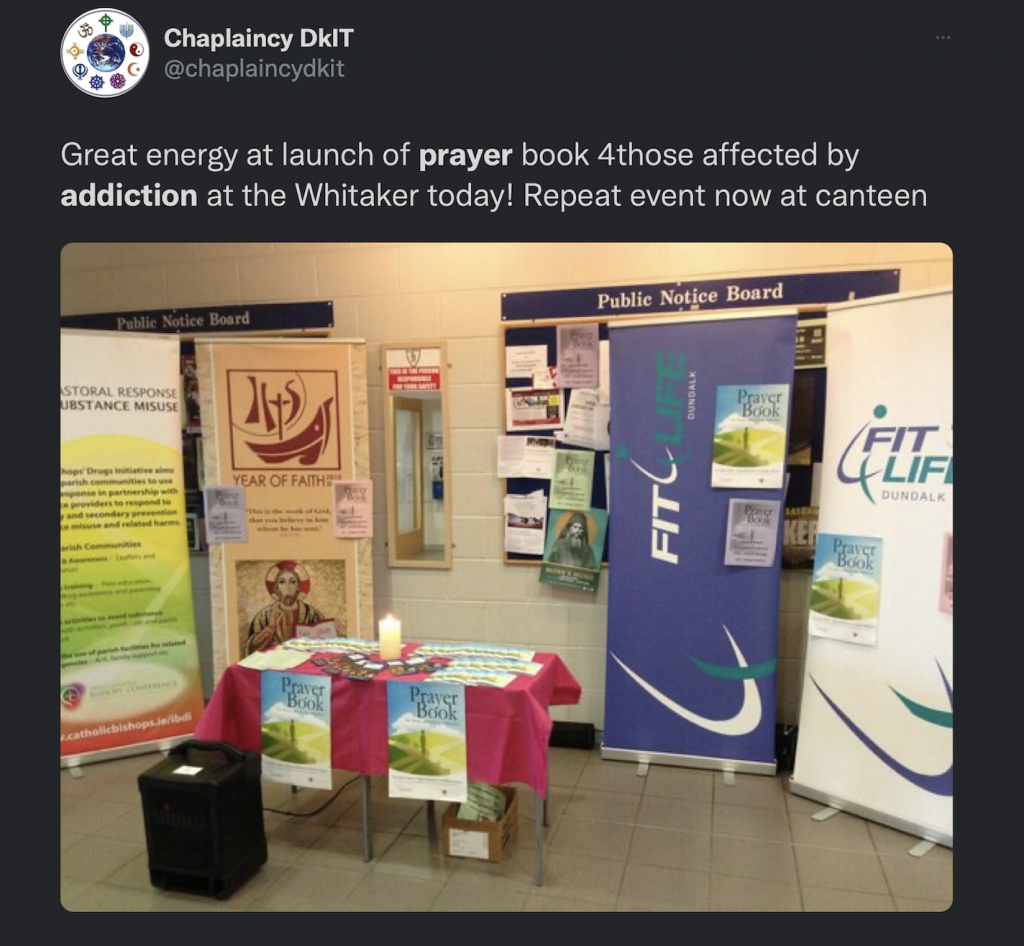
My correspondence suggested that I should arrange a Pastafarian service at the chaplaincy, which would be “opposed to addressing addiction through supernatural intervention”. This is consistent with the origin of the Church Of The Flying Spaghetti Monster, which relates to evidence-based education. A full copy of the prayer book is available at the bottom of this page. The extract below illustrates how the prayer book in question begins, which involves a pretty incredible gospel-based claim.
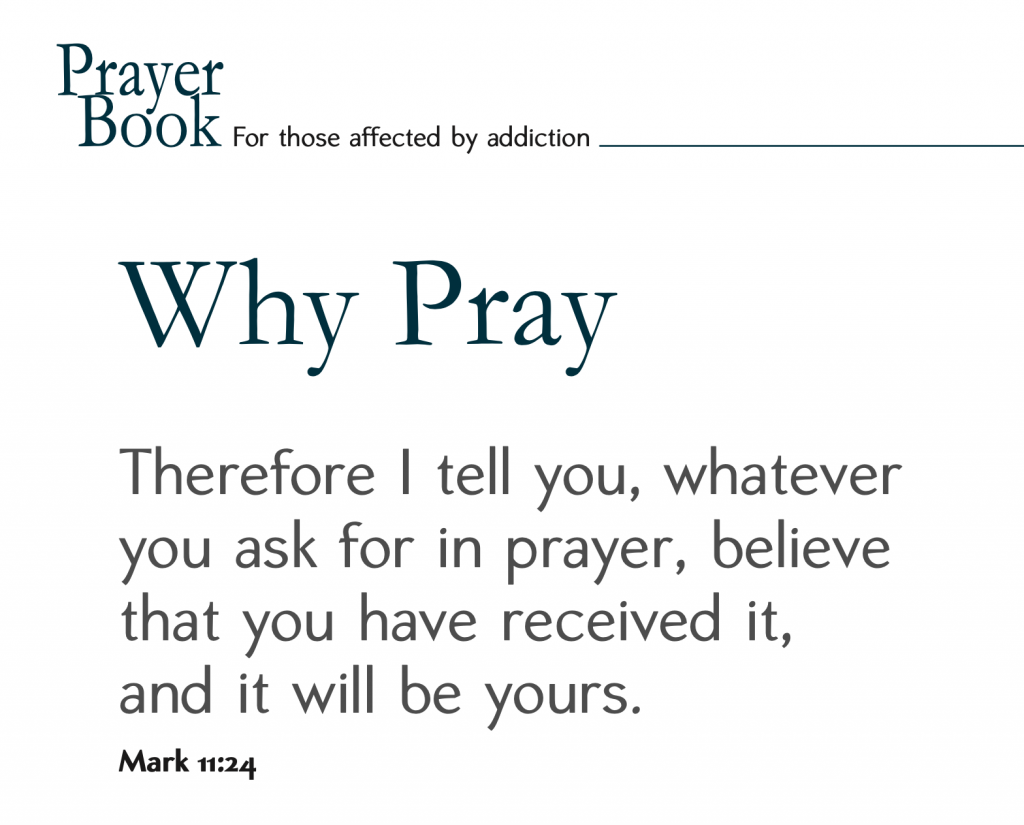
Fr Rushe was not willing to facilitate my proposed service on campus, and in fact the details below describe a long history at DkIT of facilitating the religious while excluding opposing views. It is extraordinary that a fully State-funded secular Institute of third level education would employ someone to promote supernatural intercessionary prayer as an effective way to deal with addiction, while excluding alternative evidence-based perspectives. As such, I initiated religious discrimination litigation against DkIT, according to the terms of the Equal Status Act.
Below is a summary of the main issues relating to the case, and all of the documents providing the most comprehensive arguments on both sides, are available at the bottom of this page.
Background
Since Fr Rushe had ignored my registered post correspondence to him, I submitted an ES1 Form to the DkIT chaplaincy on 28th January 2020. This document includes formal notification that there is a possibility of a legal claim, as required by the Equal Status Act. A full copy of my form is available at the bottom of this page, within Appendix 2 to my written submission in advance of the legal Hearing. From the very first step in this process, my ES1 Form contrasted the way in which I was treated, to the way in which Archbishop Eamon Martin had been treated when he made an almost identical request. The quote below is taken from that ES1 Form:
For example, Dundalk IT arranged a visit to the campus for Archbishop Eamon Martin, after His Excellency reported to the Chaplain that he was “doing a tour of the area”.
Quote from my ES1 Form
In addition to comparing how my request was treated to how equivalent religious requests were treated, my ES1 Form went on to pose the following two questions to DkIT:
- “Has the Chaplaincy at Dundalk IT ever facilitated any non-religious service from any external non-religious body, which described non-religious beliefs that are explicitly opposed to Roman Catholic beliefs?”
- “Whereas the Dundalk IT Chaplaincy has arranged a very large number of Roman Catholic Services; and whereas the Dundalk IT Chaplaincy has declined to arrange my non-religious service; is there any objective reason to explain this less favourable treatment of me, other than the fact that I have no religious beliefs while those who have been permitted to arrange services have religious beliefs? ”
The full response from DkIT is included in Appendix 2 to my written submission, which is available at the bottom of this page. In summary, I was told that I could contact the DkIT venue hire service in order to enquire about renting some of the facilities on campus. I highlighted the inequity of this response to DkIT as follows:
“There have been literally hundreds of Roman Catholic services arranged by the Dundalk IT Chaplaincy on campus, including those for external Roman Catholic votaries from the broad catchment area of the Institute, and at no time has the Roman Catholic Church been charged by the Institute for facilitating any of those services. I now understand your policies to require that not even a single non-religious service opposing Roman Catholic teachings can be permitted, without a charge being applied. These policies appear designed to welcome and promote those with religious beliefs, while creating prohibitive barriers to those with non-religious beliefs.”
Quote from Correspondence to DkIT
Within some further correspondence on 6th February 2020, I then asked again that the DkIT chaplaincy might facilitate my proposed service:
“I’d like to propose that the Chaplaincy should facilitate my one-hour Pastafarian service at lunchtime on Tuesday 3rd March, which should be arranged by the Chaplaincy at no cost to me.”
Quote from Correspondence to DkIT
DkIT persisted in refusing to facilitate my non-religious service on the same basis as they had facilitated religious services, and so the case proceeded to litigation.
Hearing
When this case was argued, there wasn’t any dispute about what had been requested of DkIT and what the response had been. All of this information was captured in written correspondence. My contention was that contrary to Section 3.2(e) of the Equal Status Act, DkIT had treated me less favourably than religious figures like Archbishop Eamon Martin, because I do not have any religious belief. The DkIT contention was that I had been treated less favourably than the religious, based on two objective and well-justified policies, which offered coherent reasons for my exclusion that had nothing to do with religion. Those two purported policies are described below.
Invitation From Staff Or Students
During the Hearing and in their written submission in advance of the Hearing, the DkIT legal representation argued as follows:
“It is the policy of the Institute that requests for religious and non-religious services must come from student or staff bodies … Any external group must be invited by either students or staff to access its facilities free of charge. Otherwise, the group or individual must reserve a room through the Institute’s normal channels which does incur a fee.”
Quote from DkIT Submission
In this context, it is important to note that Fr Rushe as the chaplain at DkIT was not a member of staff at the Institute. The Institute had appointed the Archdiocese of Armagh as the service provider for their chaplaincy, and Fr Rushe was merely the representative provided by the Archdiocese. In fact, an important part of the case argued by the legal representative of DkIT, emphasised that Fr Rushe was not a member of staff in the following terms:
“Fr Rushe and the Dundalk Institute of Technology are not the same legal entity. Fr Rushe was not even an employee of the Institute. The chaplaincy service was provided to the Institute on a contract for services basis …”
Quote from DkIT Submission
In this context, Fr Rushe arranged very many Roman Catholic events on campus that had not been requested by any student or member of staff. None of these events incurred a charge from DkIT, but rather all facilities (including catering) were provided at no cost to Fr Rushe or the Church. These events were not just limited to promoting the prayer book or facilitating the presentation by Archbishop Eamon Martin. Several other examples were cited during the Hearing, including the series of talks described below.
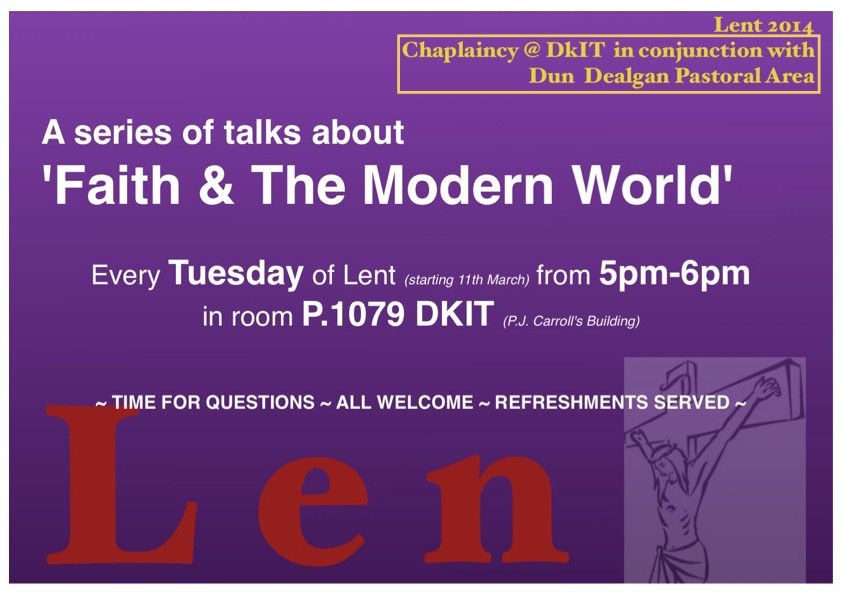
Moreover, it was also the case that a student at DkIT had indeed requested a Pastafarian service at the chaplaincy, but that this request had been refused. For example, when the request prayer services illustrated below was sent to Fr Rushe, he responded by stating that, “during the term, generally, if I am on campus, I usually celebrate Mass myself, and anyone is welcome to attend”.
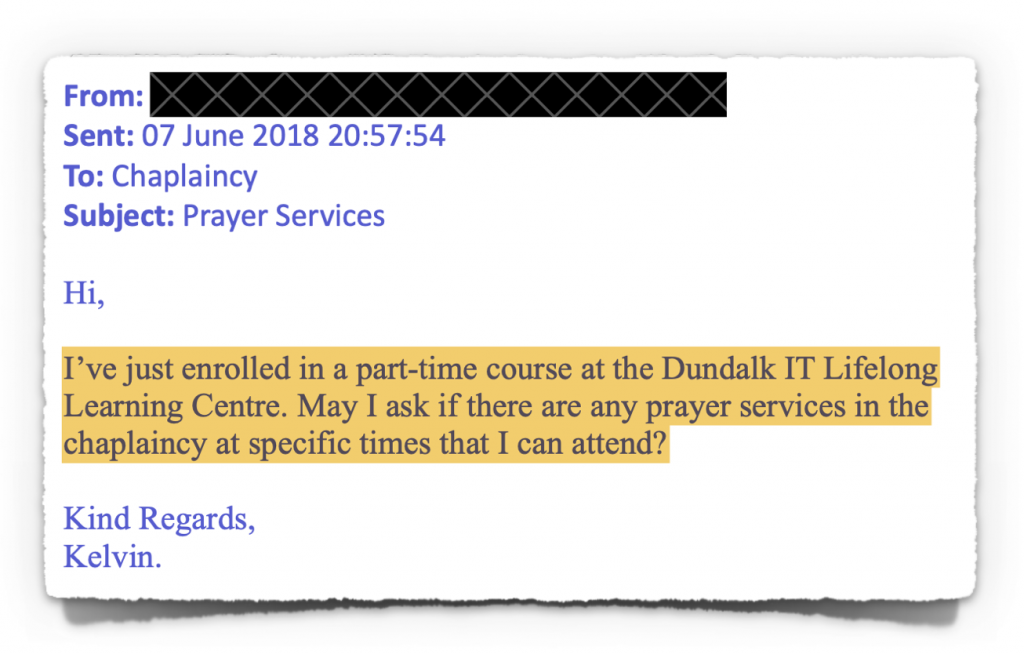
However, when this student went on to explain that he was interested in a Pastafarian service rather than Roman Catholic Mass, then the response of the chaplain changed.
In the context of the student initially reporting that he was enrolled in a Lifelong Learning course, the immediate response of Fr Rushe was to invite the student to attend Mass. However, only after an alternative non-religious service was sought, Fr Rushe then informed the student that chaplaincy services were not available to those on Lifelong Learning courses. The email from Fr Rushe illustrated below, directly contradicts the prospectus that was advertised towards those considering paying DkIT for Lifelong Learning courses. Specifically, the guide published towards prospective students at the time, stated that “The DkIT Chaplaincy is available to all students”.
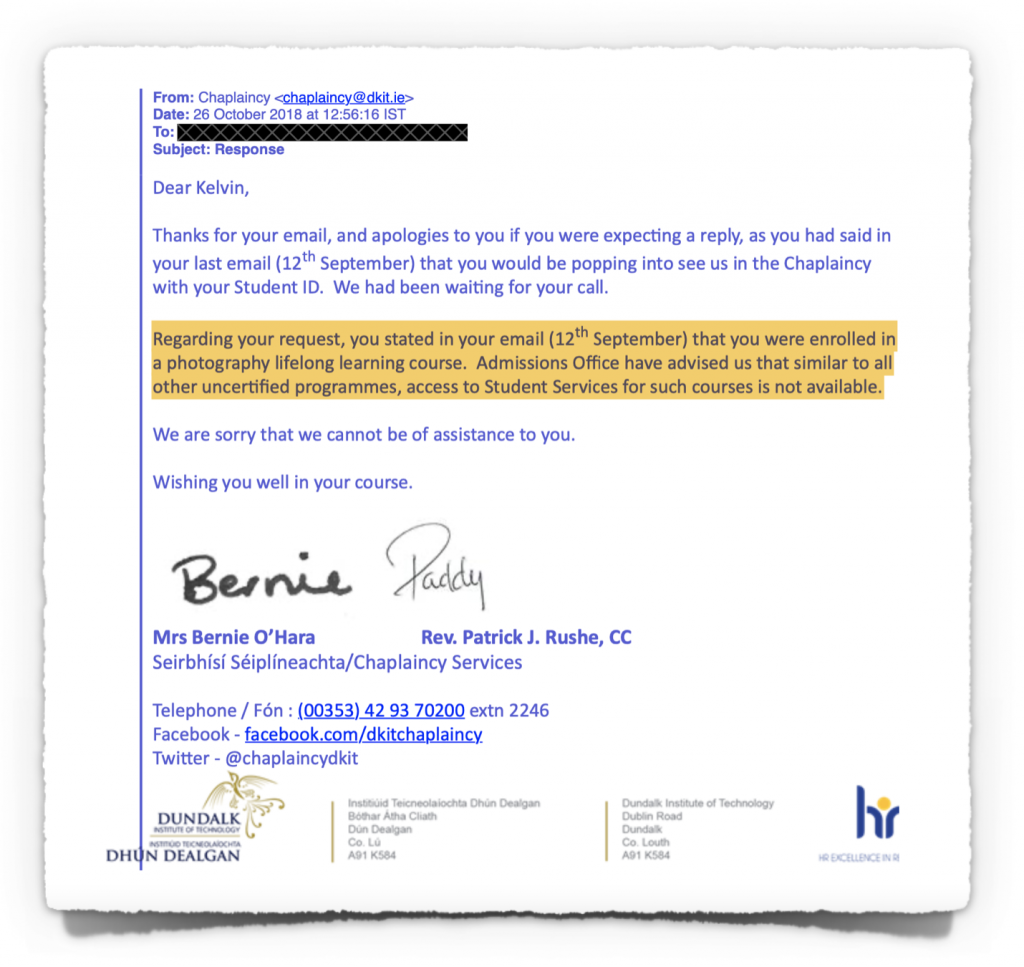
In response, the student asked Fr Rushe some follow-up questions. For example, he enquired whether Mass on campus was also unavailable to other students on the same Lifelong Learning course based on this policy; and if this were the case why did the chaplain initially invite him to Mass after he had reported that he had enrolled on a Lifelong Learning course? The response from Fr Rushe to these follow-up questions is illustrated below.
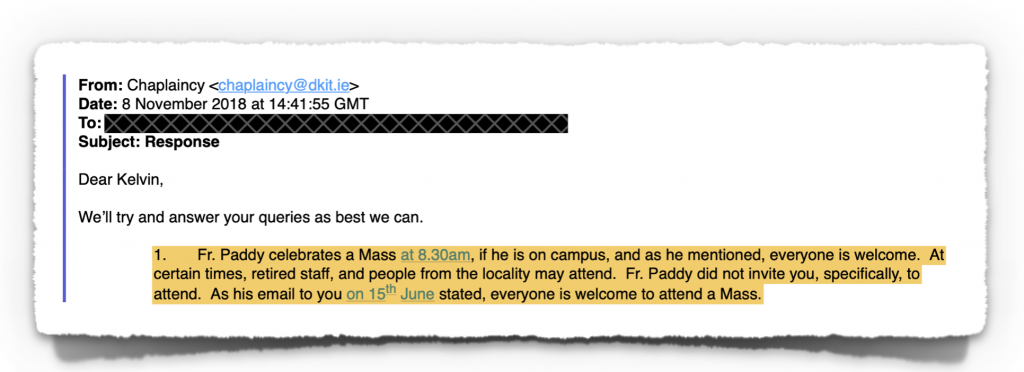
This response does not seem consistent with the purported DkIT policy, stipulating that non-religious services will be facilitated when requested by a student. In fact, that policy had never been written down and the witnesses from the DkIT senior management team during the Hearing could not say who had adopted the policy or when. If this was an unwritten rule that everyone knew to adhere to and enforce, then it didn’t seem to be well-understood or consistently enforced by the chaplain. The student who requested the Pastafarian service went on to state as follows in a subsequent formal complaint to DkIT:
“… this confirmation from Fr Paddy on 8th November 2018 that I can still attend Mass at the DkIT Chaplaincy (but not access services of other denominations) seems to be the text book definition of religious discrimination. If I was baptised as a Roman Catholic tomorrow morning there would be a religious service for me at DkIT Chaplaincy, but because I am a non-Catholic student there is no service for me.”
Formal Complaint to DkIT
The formal complaint submitted by the student was not upheld by DkIT. In the context of the Hearing though, I argued that the purported policy described by DkIT was in fact a post-hoc attempt at rationalising their religious discrimination. That is, I argued that there was no policy requiring all external events to be at the invitation of staff or students. In fact, many Roman Catholic events had been facilitated at no cost without such invitations, such as the event arranged for Archbishop Eamon Martin. Moreover, when non-religious events were indeed requested by students, those were refused too. I argued that the policy which was enforced in practice, was one that facilitated the religious while excluding the non-religious.
No Recruitment Allowed
The second purported policy that the DkIT legal representative referred to, which he argued offered an objective reason for excluding me, was described as follows in the DkIT written submission in advance of the Hearing:
“The Institute will not facilitate religious and non-religious bodies attempting to use its facilities in the recruitment of students and staff.”
DkIT Submission
I had indeed been open that one of the aspirations for my proposed service was to recruit students to my perspective, which was opposed to the perspective that Fr Rushe was promoting. The DkIT legal representative stated that the Institute had a strict policy prohibiting the recruitment of students on campus, even though this policy had never been written down and nobody knew who had adopted it, or when. He did not mention why it was impermissible to recruit students to evidence-based approaches to dealing with addiction, while it was permissible to recruit students to prayer-based approaches to addiction.
In response, I argued that this purported policy was also an attempt at rationalising religious discrimination, since no such policy in fact existed in practice. For example, we might wonder why the chaplain brought his prayer book to all of the most frequently attended places on campus, if not to recruit the greatest possible number of students to his perspective. We might also wonder what the purpose might be of the chaplain advertising that “all are welcome” to the event about “Pope Francis and the Church in Ireland” that he arranged for Archbishop Eamon Martin, if not to recruit new people to that Church.
Moreover, Appendix 9 to the written submission of DkIT is available at the bottom of this page and it includes the advertisement illustrated below.
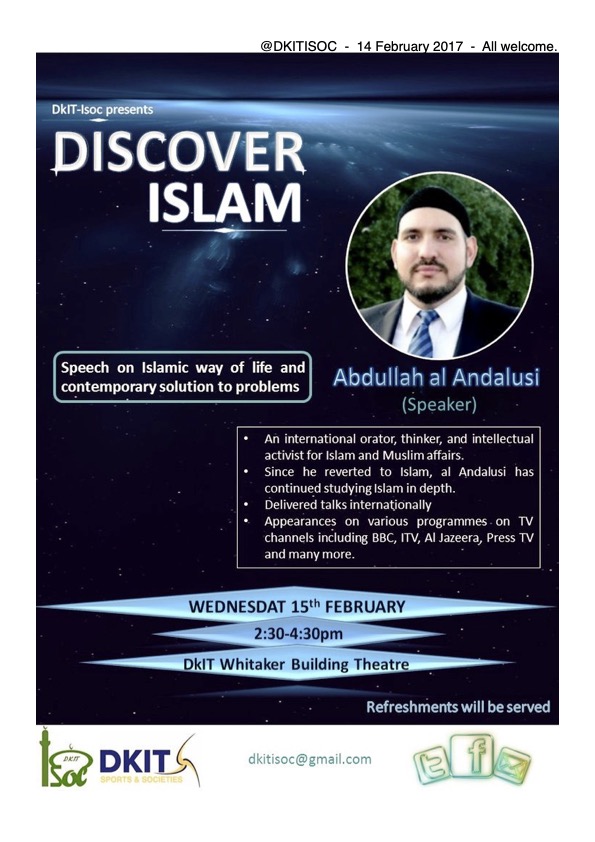
In response to DkIT citing a purported policy banning the recruitment of students, I had drawn attention to this event featuring Abdullah al Andalusi. As it happens, I know Abdullah personally, as I had been on the opposite side from him during a debate at UCD. I found him great fun to talk with, and of course it is a good thing that the DkIT Islamic Society can invite him to campus.
On his web site, Abdullah describes himself as an “activist for Islam” who is involved with “promoting the Islamic way of life”. However in evidence taken during the Hearing, the senior management at DkIT accepted that nobody had told the DkIT Islamic Society about their supposed ban on recruitment on campus, and that there was no effort made to enforce such a ban at this event. Instead, the DkIT legal representative argued that this “Discover Islam” event, which was advertised under an “all welcome” heading, had nothing to do with recruitment, stating as follows:
“He’s saying they were in there to recruit people. They weren’t. I mean, they might have come in to talk but there’s no such thing as they were in to recruit people into the Muslim faith …”
DkIT Submission
In response, I argued that this position was simply not credible. The idea that this event merely involved people talking objectively about Islam to students, in contrast to my proposed event involving recruiting students to my particular perspective, seems absurd. Who could a “Discover Islam” event be aimed at, other than those who have not yet discovered it? Why would anyone “promote the Islamic way of life” towards non-Muslims, if not to convince them to adopt that way of life?
I argued that there was in fact no actual policy banning the recruitment of students on campus. I argued that the policy which was actually enforced in practice, was one that facilitated the religious while excluding the non-religious. Notwithstanding my arguments, these were the two purported policies that DkIT presented as being objectively enforced for everyone, which explained the less favourable treatment of me as compared to the religious.
Conclusion
In order to sustain a religious discrimination complaint according to the terms of the Equal Status Act, it is necessary for a complainant to highlight a comparator. That is, in order to demonstrate less favourable treatment on the religion ground, the complainant must compare their treatment to that of someone else and contrast the treatment of each person. In this case, I used Archbishop Eamon Martin as my comparator, based on the event advertised in the poster illustrated below.
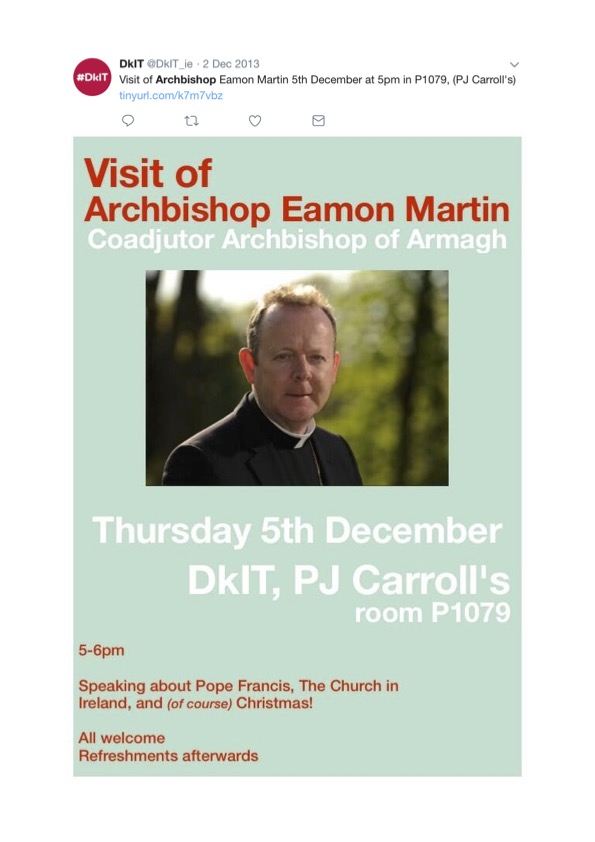
Archbishop Martin was not invited to campus by a member of staff or a student. He had informed Fr Rushe that he was “doing a tour of the area” and that he was “in Dundalk that day”. Fr Rushe, who was not a member of staff, then proceeded to make all of the arrangements. This included providing facilities at no cost to Archbishop Martin, with catering for all attendees, and then advertising the event through various official DkIT channels.
When he contacted the chaplain, Archbishop Martin was not told to contact the venue hire service at DkIT, as I was. Despite the fact that Archbishop Martin was there explicitly to promote “the Church in Ireland”, he was not informed that recruiting people to his organisation on campus is banned, as I was. As such, my submission was that I had been treated less favourably than Archbishop Martin, because Archbishop Martin is a Roman Catholic while I have no religious beliefs. This comparison with Archbishop Eamon Martin was a central part of both my written submission in advance of the Hearing, and also my oral presentation during the Hearing. The extract below from the concluding summary of my written submission, provides an overview of this comparison.
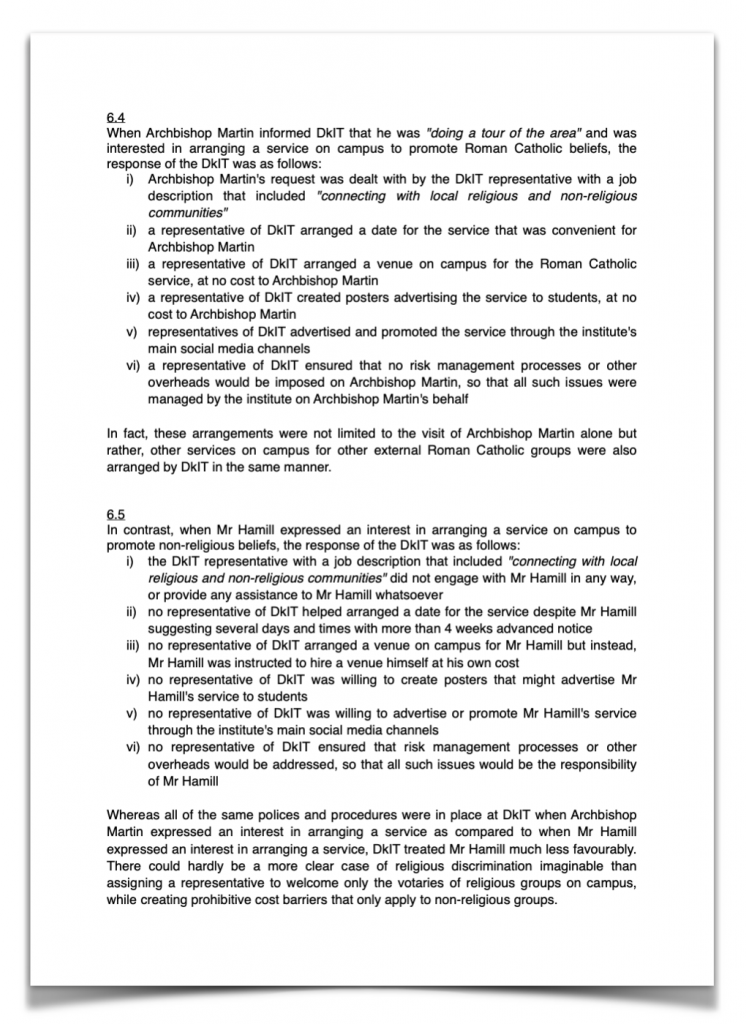
Neither Archbishop Eamon Martin nor I was a student or a member of staff within DkIT at the time. Neither Archbishop Eamon Martin nor I was invited to present at the Institute by a student or a member of staff. Each of us had sent a speculative and unsolicited request to the chaplain suggesting that we make a presentation on campus. The different ways in which DkIT responded to Archbishop Eamon Martin as compared to me, represented the central argument that I had made about religious discrimination towards the Hearing.
There was also one further outstanding issue that was not addressed during the Hearing, which related to the Burke vs Minister for Education case at the Supreme Court. My follow up written submission provided on that issue after the Hearing, is also available at the bottom of this page.
Decision
On 7th November 2022 I received a written copy of the written Decision in this case. A full copy of that Decision is available at the bottom of this page, and the relevant extract is illustrated below.
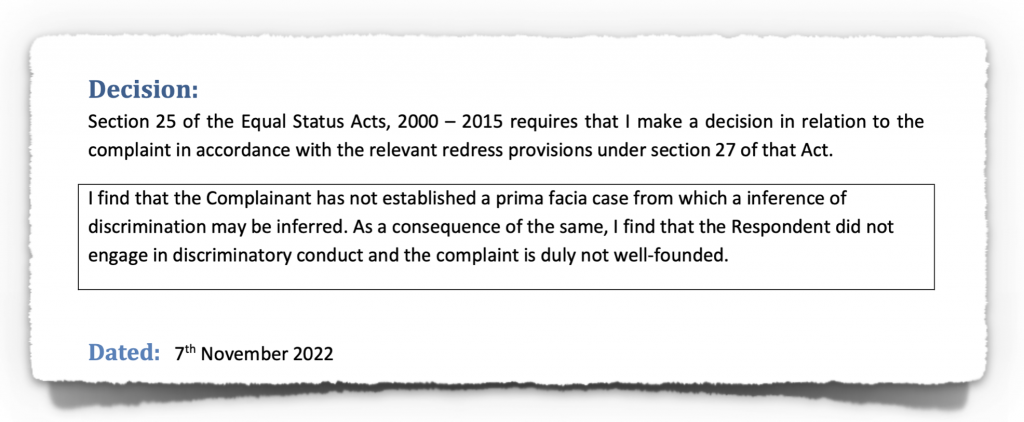
The Decision does not attempt to explain why I was treated differently from Archbishop Eamon Martin, despite this being the specific comparator case that I outlined both in my written submission in advance of the Hearing, and also in my oral arguments during the Hearing. Instead, the Decision deals with this comparator by ignoring it. Despite the comparison between my treatment by DkIT and that of Archbishop Eamon Martin being the central core of my argument, you will search the Decision in vain for any explanation as to why these two cases were treated so differently by DkIT. The position of DkIT was that I was banned and the Archbishop was not, because I was seeking to recruit people to my perspective while the Archbishop was not. However, the Decision does not attempt to resolve whether this is a reasonable explanation for the differing treatment or otherwise. It simply pretends that there were no religious comparators to my request. For example, consider this extract from the Decision:
“The Respondent is a third level institute charged with educating a cohort of students. Naturally, this is not the sole function of the Respondent, such organisations engage in research and have some community functions. What the Respondent is not, however, is a public forum whereby anyone without any connection to the organisation may advocate their particular set of views or opinions. As such, the rule that a person or group unconnected with the institute must discharge a fee to utilise their services is reasonable in the circumstances.”
Extract from the Decision
An uninformed reader would understand this paragraph to imply that I had sent a speculative request for free facilities into DkIT, and they had quoted their standard fees to me in the same way as they had responded to everyone else. Notwithstanding the central point of this case that DkIT never quoted those fees to any of the religious applicants, the Decision simply pretends not to have noticed that many religious services were facilitated free of charge. There was no charge to the Roman Catholic Church for hosting daily Mass at DkIT, for the “Series Of Talks About Faith In The Modern World”, or for the Archbishop Eamon Martin event about “Pope Francis and the Church in Ireland”. None of those events were told that they “must discharge a fee to utilise their services”. DkIT accepted that none of those events incurred a charge and argued that the difference with my event was explained by their purported “no recruitment allowed” policy. However, the Decision simply pretends that none of these comparisons were ever raised, and says nothing whatsoever about the supposed “no recruitment allowed” policy.
Read the documents for yourself. The central point of my written submission was that all of the religious services were provided for free, whereas a charge was applied for equivalent non-religious services. You will search the Decision in vain for any effort to address this comparative differences in treatment between the religious and the non-religious. The Decision simply pretends that no religious services were ever provided with free facilities. It refers to “the rule that a person or group unconnected with the Institute must discharge a fee”, but turns a blind eye to the fact openly recognised by DkIT, that this supposed rule was never applied to any religious groups ever. Not even once. No religious group was ever subject to this purported rule under any circumstances whatsoever, and the Decision didn’t even bother to mention that.
- My Written Submission In Advance Of Hearing
- Appendix 1 To My Written Submission
- Appendix 2 To My Written Submission
- Appendix 3 To My Written Submission
- Appendix 4 To My Written Submission
- Appendix 5 To My Written Submission
- DkIT Written Submission In Advance Of Hearing
- Appendix 1 To DkIT Written Submission
- Appendix 2 To DkIT Written Submission
- Appendix 3 To DkIT Written Submission
- Appendix 4 To DkIT Written Submission
- Appendix 5 To DkIT Written Submission
- Appendix 6 To DkIT Written Submission
- Appendix 7 To DkIT Written Submission
- Appendix 8 to DkIT Written Submission
- Appendix 9 to DkIT Written Submission
- Appendix 10 to DkIT Written Submission